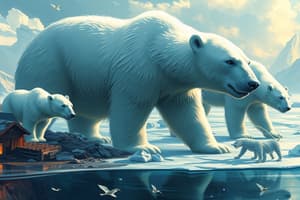Podcast
Questions and Answers
What is a consequence of coral bleaching events?
What is a consequence of coral bleaching events?
- Coral reefs can become more colorful due to stress.
- Corals become immune to plastic ingestion.
- Corals can adapt quickly to changing water temperatures.
- Corals may turn completely white and often do not survive. (correct)
How do marine animals misinterpret plastic in their environment?
How do marine animals misinterpret plastic in their environment?
- They rely on smell to identify food and avoid plastic.
- They learn not to eat non-organic materials over time.
- They reject plastic as inedible material.
- They recognize plastic as part of their natural food sources. (correct)
What are microplastics?
What are microplastics?
- Plastics that are naturally occurring in marine environments.
- The result of plastics that are broken down into smaller pieces. (correct)
- Plastic products that are larger than a grain of rice.
- Type of food that coral provides for fish.
What is one potential outcome if plastic pollution in the marine environment increases?
What is one potential outcome if plastic pollution in the marine environment increases?
What is a suggested action to help reduce plastic in the marine environment?
What is a suggested action to help reduce plastic in the marine environment?
What role do microorganisms play in the marine food web?
What role do microorganisms play in the marine food web?
How does climate change impact small fish that rely on microorganisms for food?
How does climate change impact small fish that rely on microorganisms for food?
What can result from a decrease in the population of small fish in an ecosystem?
What can result from a decrease in the population of small fish in an ecosystem?
What is a significant consequence of habitat loss on biodiversity?
What is a significant consequence of habitat loss on biodiversity?
What action contributes to habitat loss in ecosystems?
What action contributes to habitat loss in ecosystems?
What is coral bleaching primarily caused by?
What is coral bleaching primarily caused by?
What role do coral reefs play in the economy?
What role do coral reefs play in the economy?
Which of the following statements is true about microorganisms?
Which of the following statements is true about microorganisms?
Flashcards
Population Change
Population Change
A change in the number of individuals of a specific species in an ecosystem.
Climate Change Impact
Climate Change Impact
Changes in climate can cause species to move to different areas, affecting food sources and habitats.
Species Interdependence
Species Interdependence
Changes in the population of one species often affect the populations of other species in an ecosystem because they are part of the same food web or habitat.
Habitat Loss
Habitat Loss
Signup and view all the flashcards
Extinction
Extinction
Signup and view all the flashcards
Coral Reefs
Coral Reefs
Signup and view all the flashcards
Coral Bleaching
Coral Bleaching
Signup and view all the flashcards
Microorganisms
Microorganisms
Signup and view all the flashcards
Coral Bleaching
Coral Bleaching
Signup and view all the flashcards
Plastic Pollution
Plastic Pollution
Signup and view all the flashcards
Microplastics
Microplastics
Signup and view all the flashcards
Marine Environment
Marine Environment
Signup and view all the flashcards
Plastic Consumption by Sea Turtles
Plastic Consumption by Sea Turtles
Signup and view all the flashcards
Study Notes
Population Changes
- Seabirds nest on cliffs and dive deep to eat small fish.
- Small fish eat microorganisms which make their own food.
- Microorganisms live in cold water.
- If water warms, microorganisms move to cooler water, so do the fish that eat them.
- Seabirds lose food if fish move, and may die or find new habitats.
- Population change - alteration in the number of individuals in a population.
- Climate change can affect species populations by changing their habitat.
- Changes in one species' population can impact others in the ecosystem.
Habitat Loss
- Habitats provide organisms with needs to survive.
- Humans change habitats by building, roads, polluting water, or overfishing.
- Human activity can affect the weather & temperature.
- Habitat loss is a primary cause of extinction.
- Coral reefs are diverse & valuable ecosystems.
- Coral reefs support fish, other corals, and sea life.
- Coral reefs are important for tourism & income.
- Coral bleaching occurs when water temperatures rise.
- Corals lose algae & turn white.
- Bleaching stresses corals, often leading to death.
- Healthy habitats are crucial for all organisms in a food web.
- Loss of coral reefs can impact the entire ocean food web.
Plastic Pollution
- Large amounts of plastic enter the marine environment.
- Animals (fish, turtles, seabirds) mistake plastic for food.
- Plastics aren't nutritious & can be harmful.
- Plastic breaks down into smaller pieces (microplastics).
- Coral filters seawater, also ingesting microplastics.
- Increased plastic in the marine environment could harm marine life.
- Actions to reduce plastic waste in the marine environment needed.
Studying That Suits You
Use AI to generate personalized quizzes and flashcards to suit your learning preferences.




